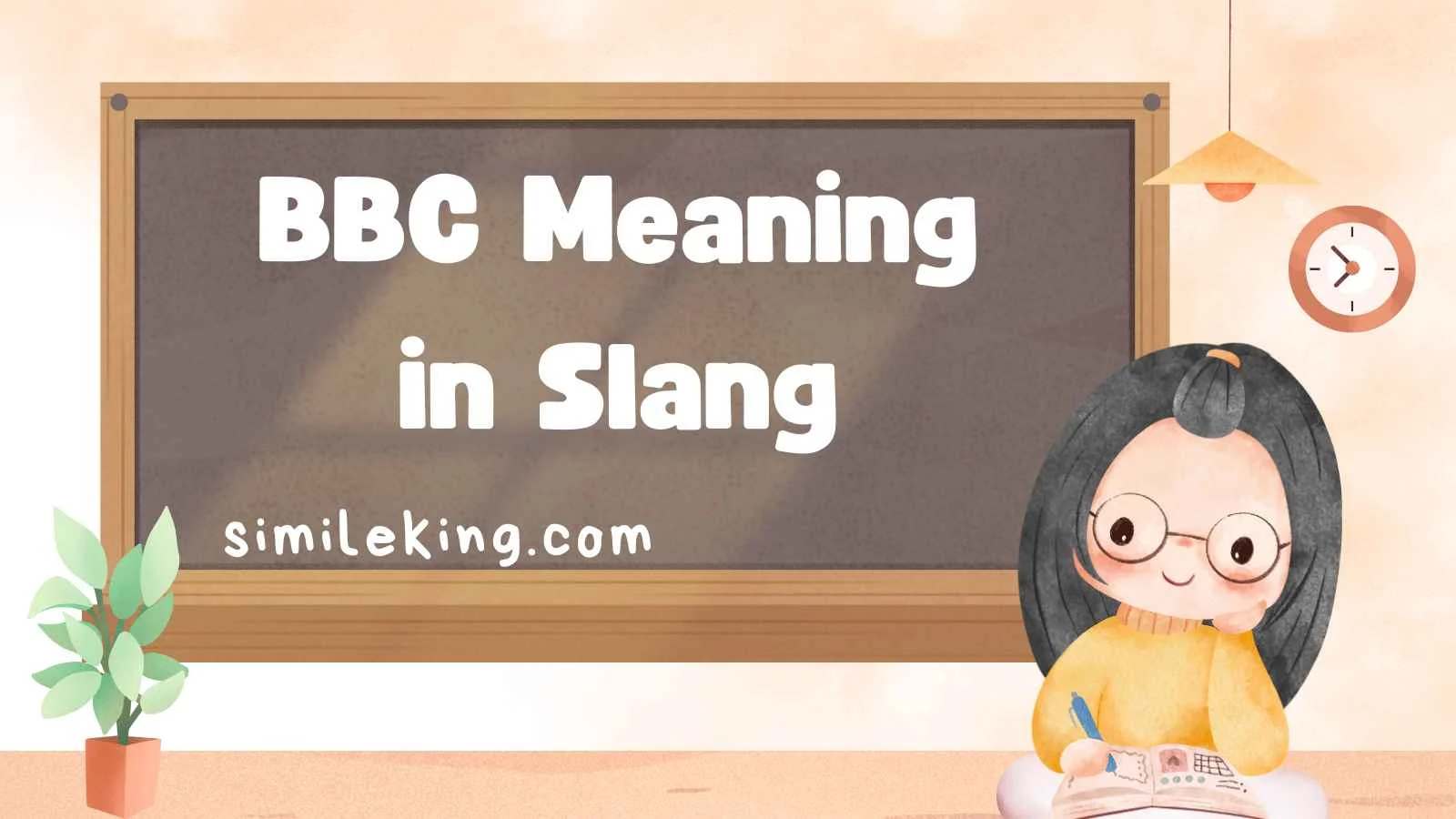Slang evolves rapidly, especially online.
Acronyms that carry one meaning in a formal environment may carry very different, sometimes sexual or taboo, ones in more informal spaces.
One such acronym is BBC. Outside its official role as an abbreviation for the British Broadcasting Corporation.
“BBC” has acquired slang uses—some widely known, others more niche or context-bound.
In this article we’ll explore:
- The formal meaning of “BBC.”
- The slang meaning(s): origin, usage, risks, connotations.
- Nuances of tone, audience, and context.
- How to decide whether usage is acceptable.
- Alternatives or ways to rephrase depending on setting (formal, casual, professional).
- Ten example sentences illustrating different tones and contexts.
- Practical advice for readers encountering or considering using the term.
1. Formal / Official Meaning
“BBC” formally stands for British Broadcasting Corporation, a public service broadcaster based in the UK. Merriam-Webster+2Wikipedia+2
As the BBC is a highly respected institution in many parts of the world, in most formal writing, broadcasts, news, academic work etc., “BBC” is unambiguous and neutral—it refers to that organization. In legal, journalistic, academic, and pedagogic settings, it is the safe meaning.
2. Slang Meanings: Origins and Usage
a) “Big Black Cock” meaning
- One of the main slang uses of “BBC” in English (especially internet English, pornographic contexts, erotic fiction, informal sexual conversation) is as an acronym that stands for “Big Black Cock”, referring to a stereotyped image of a black man’s penis. Wikipedia+2Dictionary.com+2
- This meaning is sexual, explicit, and accompanied by racial stereotypes. It tends to appear in sexual content, adult entertainment tags, and sometimes in memes or “shock value” speech. It is not appropriate in polite or professional contexts.
- It also carries harm in many cases: reinforcing stereotypes, fetishizing race, and contributing to demeaning or objectifying imagery. Scholars and critics have pointed out that even when the term is used “consensually” among adults, its widespread acceptance reflects societal attitudes about race, sexuality, and power. Wikipedia
b) Other informal / meme‐style usages
While “Big Black Cock” is the most common slang expansion, in casual or meme contexts people sometimes reinterpret or mock it, or use “BBC” as a pun. For example:
- Using “BBC” ironically to reference the taboo meaning among friends or on forums.
- Using “BBC” to provoke or shock, relying on dual meaning: the innocent meaning (British broadcaster) and the explicit meaning.
- Sometimes variants or euphemisms are used (e.g. “BBC” followed by blanking out or partial censorship) in social media posts.
c) Where it shows up in 2025
- On platforms like TikTok, Reddit, Instagram, there remain trending posts or hashtags using “BBC” in the explicit sense. Some content creators implicitly or explicitly reference the sexual slang meaning, often in comedic, provocative or adult content spaces.
- Because content moderation policies tighten, many of these usages are filtered, shadow-banned, or removed, depending on platform and geography. Users in 2025 report that social media platforms increasingly flag or remove usage of “BBC” when it’s unambiguously sexual.
3. Nuances: Tone, Audience, and Context
Whether “BBC” is offensive, acceptable, or simply provocative depends heavily on a few factors:
| Factor | Influence on Acceptability / Meaning |
|---|---|
| Audience | Among close friends in a private chat, usage may be more tolerated. In public, mixed company, or professional settings, less so. Also, cultural background matters: what is taboo or shocking in one culture may be more normalized elsewhere. |
| Platform / Medium | What’s allowed on adult sites vs mainstream social media vs workplace communication differs. Also, written vs verbal use changes perception. |
| Intent / Tone | Is the usage flirtatious, comedic, insulting, fetishizing, neutral? The intent can change how it is received (though not always its appropriateness). |
| Clarity / Ambiguity | If it’s ambiguous—could mean “British Broadcasting Corporation”—there is less risk than when it’s clearly sexual. Also, whether it’s masked (e.g. “B-B-C” or spoken with hesitation) changes things. |
| Cultural / Racial Dynamics | Because the sexual slang meaning uses race and sexual stereotypes, it often intersects with power, taboo, and potential offense. Readers who belong to racial minorities might find it more upsetting. |
4. Risks & Consequences of Using “BBC” as Slang
- Misinterpretation: Someone may misunderstand and think you meant the broadcaster, leading to embarrassment or confusion.
- Offense: The sexual meaning is explicit; many people will find it inappropriate in public or formal settings. Also, it may perpetuate negative stereotypes.
- Platform penalties: On social media, content with sexually explicit terms may violate community guidelines. Posts can be removed, accounts suspended.
- Professional & legal consequences: Using or referencing explicit sexual slang in workplaces, academic settings, or business communication could be unprofessional or even actionable (harassment).
- Cultural sensitivity: Because racial stereotyping is involved, using this term can contribute to exotification, fetishization, and unequal treatment.
5. How to Decide Whether to Use It
If you’re considering using “BBC” in conversation, writing, or media, here are guidelines:
- Always consider your audience first. If any person in the group is likely to be offended, misunderstand, or consider it unprofessional, avoid it.
- Use formal, neutral alternatives when in doubt. For example, if you want to refer to the British broadcaster, write it out (“British Broadcasting Corporation”); if you need to refer to a sexual attribute, use descriptive but less slangy language, ideally with consent and clarity.
- Check platform rules. Social media sites, workplaces, schools often have rules about profanity, sexually explicit content, harassment.
- Assess necessity. Does using the slang add meaning that you could not get with a less risky expression? If not, drop it.
- Be aware of legal & cultural contexts. What is acceptable in one country may be illegal or severely taboo in another.
6. Alternatives / Rephrasing Depending on Setting
Here are ways to express different meanings or sentiments instead of using “BBC” (in its slang sense), adjusted by formality:
| Setting | You want to say… | Alternative phrasing (polite / neutral) |
|---|---|---|
| Professional / Academic | Referring to sexual content, race/sizes, or research on fetishization | “A stereotype of exaggerated male genitalia associated with race”; “racialized sexual imagery”; “sexual content involving black men, emphasising physical attributes” |
| Casual among friends (informal, consenting) | Flirting, humor with sexual innuendo | “That guy has quite a bit going on”; “a large black male feature” (if context is understood and consent is present); “big package, black dude” (colloquial) |
| Public / Mixed audience | Avoid specificity; keep ambiguous or metaphorical | “He’s quite well-endowed”; “a substantial male attribute”; “physical feature of size” |
| Creative writing / fiction | You want imagery without being vulgar | “He possessed a remarkable physical presence, accentuated by his stature and presence”; “his form was striking in more ways than one” |
Also for non-sexual contexts or when the slang might mislead, use expressions that avoid the acronym. For example, if someone says “BBC” in a context, you might instead say “you mean the broadcaster, right?” or “just to check: do you mean something sexual?”
7. Ten Example Sentences
Below are ten example sentences showing “BBC” or its alternatives in different tones and contexts. Some use the slang meaning, some neutral, so you can see how meaning shifts.
- Formal / News-style (non-slang meaning):
“According to reports from the British Broadcasting Corporation, viewership of its international service rose by 15% in mid-2025.” - Academic / Analytical:
“The trope referred to by the acronym ‘BBC’ has been critiqued in recent studies (2025) for its role in perpetuating racialized sexual stereotypes in online pornography.” - Informal among consenting friends, sexual innuendo (slang):
“He’s always bragging—apparently he’s got BBC, if you know what I mean.” - Humorous / Meme-style (play on double meaning):
“When someone says BBC, do they mean the news channel, or… something else entirely?” - Mixed audience, trying to be polite about sensitive topic:
“Our workshop will address how sexual content in media often includes racialized imagery and exaggerated genital depictions—sometimes summarized by slang acronyms like ‘BBC’.” - Creative / Fictional usage:
“Her eyes flickered with curiosity when she overheard the whispered rumor—was it really true what people said about his size, the slang swirling around him?” - Cautious professional (avoid explicitness):
“I prefer to keep my language clinical: let’s talk about genital size rather than using slang terms that could offend.” - Casual / colloquial non-explicit alternative:
“He’s well-built in more ways than one—physically impressive.” - Amusing e‐mail / message among close friends:
“LOL, someone just typed ‘BBC’ in the group chat and I had to double check they weren’t talking about the broadcaster!” - Warning / advice context:
“Be careful using ‘BBC’ online—many platforms remove or flag it if they detect sexual content or hate speech.”
8. How “BBC” Slang Has Changed or Evolved (Recent Data & Trends 2025)
Although explicit, sexual slang doesn’t always get formal documentation, there are a few observable trends in 2025:
- Moderation / Filtering is increasing. Platforms like TikTok, Instagram, X (formerly Twitter), and Snapchat have refined algorithms to detect slang acronyms used with sexual content. Posts using “BBC” in an unambiguously sexual way are more likely to be suppressed or need to be tagged as explicit.
- Euphemistic usage rising. To circumvent moderation, users increasingly mask or partly censor the term (“B-B-C”, “BBC”, or by implication) or use indirect reference rather than explicit.
- Cross-region variation. In some countries, slang meanings of “BBC” are more known/popular; in others they are little known or very taboo. For instance, in English-speaking countries with histories of racial tension, the term is loaded; elsewhere, it might be used but less understood.
- Academic / social awareness is more common: articles, social media threads, podcasts in 2025 have begun to discuss the harm and implications of sexual slang terms like “BBC”, including mental health, stereotypes, self-esteem, and racial identity.
- Hashtag monitoring. Some trend trackers report that while #BBC remains a hashtag, posts using it with the explicit meaning tend to get fewer impressions, as the algorithm dampens visibility due to content policy.
9. Summary: When “BBC” Is Acceptable vs Not
| Acceptable When… | Not Acceptable When… |
|---|---|
| Among consenting adults who understand the slang; in private or semi-private contexts. | In professional, formal, academic, public, mixed company settings. |
| When referring to the British Broadcasting Corporation or using the acronym unambiguously. | When usage is explicitly sexual, likely to offend, or used without consent. |
| When the audience will understand both possible meanings and you want to play on ambiguity (humor, artistic writing). | When risk of misunderstanding, offense, or violation of rules is high. |
| When discussing the slang from an analytical, educational, or critical angle. | When using for shock, humiliation, or reinforcing harmful stereotypes. |
10. Suggestions for Alternatives: Polite / Professional / Casual
If you want to express something similar (size, enhancement, race, sexual connotation) but avoid “BBC”, here are alternatives by context:
- Polite / Clinical / Scientific:
- “Large penis of a black individual”
- “Racialized sexual stereotype involving genital size”
- “Anatomical exaggeration in erotic content”
- Casual / Friendly (non-provocative):
- “He’s very well endowed”
- “He’s got quite a package”
- Humorous / Slightly edgy but not explicit:
- “He’s got more than just stature; you know what I mean.”
- “Let’s just say he’s not lacking.”
- When referring to the broadcaster or general sense:
- “The BBC (British Broadcasting Corporation)”
- “The UK’s public broadcaster, BBC”
11. Frequently Asked Questions (FAQs)
Q1: Is “BBC” always sexual when used outside the context of the broadcaster?
A: Not always. Sometimes people refer to the broadcaster. But many uses outside formal media refer to the sexual slang meaning or are joking about that meaning.
Q2: Is using “BBC” with the sexual meaning inherently racist?
A: Not inherently, but it often draws on racial stereotypes. The linking of “black” with “big” in this context can reinforce fetishization of black people, which is a racialized concept. Whether it’s perceived as racist depends on how it’s used, who says it, audience, and intent.
Q3: Can non-black people use “BBC” in sexual slang?
A: They can—but using it carries extra risk of being perceived as fetishizing or disrespectful. Many recommend avoiding it unless you have strong reasons and are aware of implications.
Q4: Is “BBC” usage diminishing due to moderation?
A: Evidence suggests yes—platforms are more aggressive in moderating sexual or racially charged slang; more content is being removed or hidden. Users adapt by using euphemisms or partial censorship.
Q5: What should you do if someone uses “BBC” toward you in a context you dislike?
A: You can ask for clarification (“Do you mean the broadcaster or something else?”); express discomfort; or disengage. In workplaces or regulated settings, you might report it if it violates policy.
12. Conclusion
“BBC” is a loaded acronym: formally benign (British Broadcasting Corporation), but in slang it carries explicit sexual meaning, racial stereotype, and potential for harm. Whether one should use it depends heavily on audience, tone, setting, intent, and awareness of the risks.
For readers wanting to communicate well, here are bottom-line guidelines:
- Use formal full phrase in public or mixed company when referring to the broadcaster.
- Avoid using “BBC” slang unless you are sure of context, consent, and audience.
- If discussing the slang itself (e.g., academically or critically), do so with sensitivity to racial dynamics.
- Choose alternative expressions when you want similar meaning but need to stay respectful, professional, or safe.





